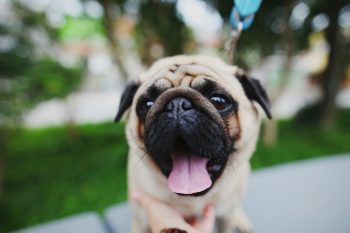Sneezing in dogs is a common occurrence and can be a charming, if somewhat messy, part of dog ownership. However, some dog breeds are more prone to frequent sneezing due to various factors such as their physical characteristics, environmental sensitivities, and genetic predispositions. While occasional sneezing is normal for all dogs, certain breeds experience it more frequently, and understanding the reasons behind this can be both intriguing and important for their health. In this article, we will explore the top 10 dog breeds known for their propensity to sneeze more than others. From brachycephalic breeds with their unique facial structures to those with heightened allergenic responses, each of these breeds has specific reasons that make them more prone to sneezing.
1. Pug
Pugs are well-known for their adorable, squished faces, but this brachycephalic trait also makes them prone to frequent sneezing. Their compressed nasal passages and the folds of skin on their face can trap pollen, dust, and other irritants, leading to more sneezing. Furthermore, their short nasal passages mean that pugs often have to work harder to clear their airways, resulting in sneezes. Pugs are also susceptible to allergies, which can exacerbate their sneezing. Regular cleaning of their facial folds and monitoring for allergens can help manage their sneezing.
2. Bulldog
English and French Bulldogs are another brachycephalic breed that often sneezes frequently. Their flat faces and wrinkled skin around the nose can accumulate irritants, leading to sneezing as a way to clear their nasal passages. Additionally, Bulldogs often suffer from a condition known as stenotic nares, where their nostrils are too narrow, making breathing (and thus sneezing) more challenging. Keeping their nasal area clean and ensuring they live in a relatively dust-free environment can help minimize their sneezing.
3. Boxer
Boxers, with their short noses and wide heads, are prone to frequent sneezing. Their brachycephalic nature makes them susceptible to respiratory issues and allergies, both of which can lead to increased sneezing. Boxers can also have sensitive sinuses, which get irritated easily by dust, pollen, or other airborne particles. Providing a clean living environment and being attentive to their allergic reactions can help reduce their sneezing.
4. Shih Tzu
Shih Tzus, with their long hair and short snouts, are predisposed to sneezing more often. Their hair can collect pollen and dust, which can irritate their nose and lead to sneezing. Moreover, the shape of their face means that they are more likely to inhale these irritants directly. Regular grooming and keeping their face clean are essential to help reduce sneezing in Shih Tzus. Additionally, monitoring for environmental allergies and managing them can also be beneficial.
5. Boston Terrier
Boston Terriers, like other brachycephalic breeds, are prone to frequent sneezing. Their short nasal passages can make it difficult for them to filter out irritants, leading to more frequent sneezes to clear their airways. They are also prone to allergies, which can further increase their sneezing. Keeping their living area free of dust and allergens, along with regular veterinary check-ups, can help manage their sneezing.
6. Yorkshire Terrier
Yorkshire Terriers are prone to sneezing due to their small size and sensitivity to environmental allergens. Their long hair can also trap dust and pollen, bringing these irritants close to their nose. Yorkies may also experience reverse sneezing, a condition common in small breeds where they make sneezing-like sounds. Keeping their hair trimmed, particularly around the face, and ensuring a clean environment can help reduce their sneezing.
7. Cocker Spaniel
Cocker Spaniels, with their long ears and hair, are susceptible to frequent sneezing. Their ears can trap moisture and lead to infections, which can cause sneezing. Additionally, their long hair can gather dust and pollen, which irritates their nasal passages. Regular ear cleaning and grooming to keep their hair away from their nose can help minimize sneezing in Cocker Spaniels.
8. Beagle
Beagles are known for their exceptional sense of smell, but this also means they are more prone to inhaling irritants, leading to sneezing. They are curious and often put their noses into things, increasing the chance of irritation. Beagles can also suffer from allergies, which can lead to increased sneezing. Keeping their environment clean and monitoring for signs of allergies can help manage their sneezing.
9. Dachshund
Dachshunds, with their long noses, are predisposed to sneezing. Their elongated nasal passages can make it easier for them to inhale dust and allergens, leading to sneezing as a way to clear their noses. They are also close to the ground, which means they are more likely to come into contact with dust and pollen. Regular cleaning and maintaining a dust-free environment can help reduce their sneezing.
10. Miniature Schnauzer
Miniature Schnauzers are prone to sneezing due to their sensitivity to environmental allergens. Their distinctive facial hair can trap dust and pollen, leading to nasal irritation. Schnauzers are also known for their active nature, often exploring environments where they can inhale irritants. Regular grooming and keeping their living spaces clean can help minimize their sneezing.
In conclusion, frequent sneezing in dogs can often be attributed to their breed-specific characteristics, such as the shape of their face and nose, as well as their susceptibility to allergies. While sneezing is a natural reflex to clear the nasal passages, excessive sneezing can be a sign of underlying health issues, such as allergies or respiratory problems. For the breeds mentioned, maintaining a clean environment, regular grooming, and attentive care to their health can help manage and reduce the frequency of sneezing. It’s also important for owners to be aware of the normal sneezing patterns of their breed and to consult with a veterinarian if there are concerns about excessive or unusual sneezing.
The post 10 Dog Breeds That Sneeze The Most appeared first on iHeartDogs.com.

